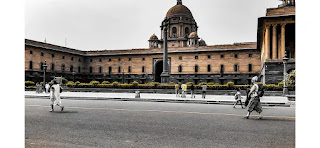Class Viiith Civics
Chap ---3 Understanding Parliament
1. Parliament
2.Functions of The Parliament
3. People in parliament
1. Parliament
The parliament is a congregation of elected representatives.It makes laws and exercises political authority on behalf of the people.
It is composed of Lok sabha, Rajya Sabha and President. According to the constitution the union government rules over the whole country.
A. Lok sabha
Other names --- Lower House, House of the people,Temporary House
Age --- Minimum 25 years
Tenure -- 5 years
📝 Note --- It can be dissolved before completing its term if the ruling party loses majority. Its tenure can be extended for a year in case of emergency.
Members (MP)
Total strength --- 552
At present --- 545
📝 Note -- Out of 545, 543 are elected and 2 members from the Anglo-Indian community are nominated by the President.
Head -- Speaker and Deputy Speaker.
B. Rajya Sabha
Other names --- Upper House, Council of the states,Permanent House
Age --- Minimum 30 years
Tenure -- 6 years
📝 Note --- After every two years the tenure of one-third of its members ends.
Members (MP)
Total strength --- 250
At present --- 245
📝 Note -- Out of 245, 233 are elected and 12 members from the literature, arts, Science and social services are nominated by the President.
Head -- Chairman and Deputy Chairman.
C. The President
Post
• Nominal head of the state
• Supreme commander of the armed forces
• First citizen of India
Age --- Minimum 35 years
Tenure -- 5 years (Can be re-elected for the second term)
Elected by -- MLA and MP
Functions
• Appoints Prime Minister, governor of States ,judge of Supreme and high court.
• Addresses joint sitting of parliament
• Issue ordinance when Parliament is not in session.
The Vice President
Age --- Minimum 35 years
Tenure -- 5 years (Can be re-elected for the second term)
Elected by -- MP of both houses
Functions
• act as a chairman of Rajya Sabha
• Takes over as President in case of absence of President.
2. Functions of the Parliament
A. Selecting the National government
➡️ The party that wins a majority of seats is invited by the President to form a government. Here majority refers to atleast half of the total seats that is 272 or more.
➡️ If no party gets a clear majority then two or more political parties can come together to form a coalition government.
➡️ One of the most important functions of the lok sabha is the selection of the executive. The executive is responsible for implementing the laws made by the parliament.
The Prime Minister
Post -- Actual Head of the state
Appointed by --The President
Term period --- 5 years ( if it has majority in the parliament)
Functions
a. Advises President on all important matters including appointment of judges, chief election commissioner etc.
b. Allocate portfolio (Department) to the ministers.
Types of Ministers
There are three categories of ministers :
Cabinet Ministers -- These ministers hold most important departments like defence, home, finance etc.
Ministers of states --- These ministers either hold an independent portfolio or work under cabinet Ministers.
Deputy Ministers --- They support both the ministers.
Note 📝 -- The Prime Minister and his Council of Ministers are jointly responsible for the decision taken this is known as collective responsibility.
B. Controlling, Guiding and Informing the government
The government is answerable to the parliament as it has to give explanation of its policies and expenses.
Question Hour and Zero Hour are the two times during the day when relevant information can be sought from the government.
Question Hour -- It is the first hour of every sitting when the ministers answer questions related to their departments.
Zero Hour -- It starts immediately after the Question Hour.. During this hour discussion over matters of public interests are held..
Thus, Mps as a representative of the people, play a key role in controlling and directing the government.
C. Control on Government Finance
The Parliament manages the finance of the country . Every year the finance minister presents the budget before the parliament.
D. Law making
There are three lists mentioned in the constitution containing some subjects on which laws can be made .
a.The Union List (The Central List)
It includes the subjects on which laws are made only by the parliament.These laws apply to the whole country.
e. g:-- Defence, Money, Banking etc
b. The State List
It includes the subjects on which laws are made only by the state assembly. These laws are specific to the states,different states can make different laws on any of these subjects.
e. g:-- Agriculture, agriculture etc..
c. The Concurrent List
It includes the subjects on which laws are made by both the parliament and the state assembly.
e. g:-- education, electricity etc.
3. People in the Parliament
Nowadays, more and more people from different backgrounds are actively participating in the functioning of the government. Regional parties are playing a crucial role in the decision-making process .
To increase the representation of SC and ST some percentage of seats are reserved for them in the parliament.






0 Comments